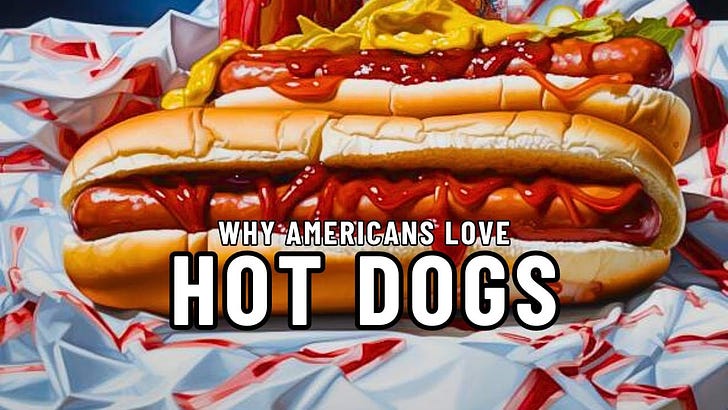Good Day Fam, Thank you for your unwavering support of One Mic History Newsletter. Today, we're thrilled to introduce an addition to our repertoire. We've launched a new YouTube channel dedicated solely to culinary history.
Today, we are going to share the history of the Hot Dog from the bustling streets of Coney Island to the home plates of modern-day baseball games.
The precise origins of sausage are shrouded in the mists of time, but it is widely accepted that their invention was closely related to the development of early food preservation techniques. Ancient civilizations quickly learned that fresh meat spoiled rapidly without refrigeration, which was not available in those times. In response to this challenge, resourceful cooks began exploring methods to extend the viability of their precious foodstuffs. They experimented with salting, drying, and smoking meats, and through this empirical process, they stumbled upon a technique that would redefine meat consumption.
The earliest documentation suggesting the presence of sausage dates back to the Ancient Sumerians of Mesopotamia, around 3,000 BCE. Art and texts hint at the existence of a form of salted and dried meat, closely resembling the concept of sausage. Moving forward, the Ancient Greeks, specifically in Homer's Odyssey dating to 9th century BCE, describe a kind of blood sausage, a delicacy tied to ritual and feasting. It is considered one of the earliest literary references to sausage-making when a swineherd inserts blood and fat into an intestine before broiling it.
The refinement of sausage-making artistry is often linked to an anecdote from the Roman Empire and the era of the notorious Roman emperor Nero, and his cook, Gaius. In ancient Rome, it was customary to starve pigs for one week before slaughter. Legend has it that Gaius, while watching over his kitchen, discovered something significant when he realized that one pig, brought out fully roasted, had not been cleaned. He stuck a knife into the belly to check the roast's edibility and found the intestines empty due to the pig's starvation diet and puffed from the heat. This prompted Gaius to exclaim, "I have discovered something of great importance!" He then proceeded to stuff the intestines with ground game meats mixed with spices and wheat, thus giving birth to the creation of sausages.
The written legacy of such craftsmanship and its surrounding lore is preserved in texts such as "De Re Coquinaria," attributed to Apicius, the Roman gourmet. The Romans proliferated sausage making throughout Europe as the empire extended its borders.
As these sausage-making methods diffused throughout Europe, regional adaptations began to take shape leading toward what would eventually converge in present-day Germany. Although Frankfurt and Vienna both assert their claim to the invention of the sausage that would become the iconic frankfurter and Wiener.
The frankfurter, in particular, has its roots deeply implanted in the city of Frankfurt am Main, with records dating back to the 13th century when these pork sausages were honed by German butcheries. Notably, they were named "frankfurter" in homage to their city of origin.. In contrast, a compelling provenance story also originates from the Austrian city of Vienna, known for the creation of the Wienerwurst. Unlike the frankfurter, which is purely a pork sausage, the Viennese version integrates both pork and beef into their culinary creation. The city of Vienna uses their term "wiener" to substantiate their claim that their city was the birthplace of the original hot dog. This terminology challenge creates a layer of complexity that adds to the intrigue of the hot dog’s origin story.
Whatever the truth was, it was German immigrants brought their culinary expertise to America, Charles Feltman, a German immigrant and baker, in 1867, realised a unique business opportunity. He envisioned a simple, convenient meal for visitors to Coney Island's amusement areas: a Frankfurt-style sausage paired with a specially designed elongated bun. This hand-held feast met growing demand for accessible and appetizing street food amongst crowds seeking entertainment at the seaside destination. Feltman's innovation formed a cornerstone of quick and economical American cuisine, establishing a link between Coney Island and the popularization of the hot dog, thereby cementing the location as an emblem of American leisure culture.
One cannot disentangle the history of Coney Island hot dogs from Nathan's Famous, established in 1916 by German immigrant Nathan Handwerker, a former employee of Feltman. Handwerker ventured on his own to establish a competing hot dog venture with a small capital investment and a distinct seasoning. Handwerker's strategic business aptitude soon brought about some deliberate changes: his hot dogs were priced at five cents, just half of Feltman's price. This stark difference in pricing, coupled with the unique flavor of his hot dogs, played a crucial role in gaining a competitive edge over Feltman's.
Handwerker's knack for the business and the quality of his hot dogs shifted the consumers' preference towards Nathan's Famous. The effective marketing strategies employed drove the business's fame sky-high in no time. Consequently, Nathan's Famous outshone its competition, establishing a commanding presence in the hot dog industry.
Despite the evolution of 'frankfurter' to the term 'hot dog' being somewhat concealed in American urban myth, Feltman, the unsung pioneer of the hot dog, played a significant role in the evolution of the classic American dish. Speculations imply that the name transition occurred at ballpark stadiums, which sold "dachshund sausages" or "frankfurters" in buns. Legend pretends a talented cartoonist unable to spell "dachshund" introduced the term "hot dog." Regardless of the obscure origins of the phrase, the German immigrants' influence in shaping this American delicacy is indisputable.
The hot dog, underwent a profound cultural and culinary metamorphosis during the turbulent years of the World Wars in the mid-20th century. When the United States entered World War I, the nation faced the monumental task of feeding its rapidly expanding military force. The hot dog, then known more formally as a frankfurter, emerged as a solution because it was hearty, non-perishable, portable, and easy to prepare. These qualities made it an essential part of soldiers' daily rations, fueling them with protein needed for strenuous activities.
The importance of hot dogs carried over into World War II, as advancements in vacuum packaging and canning methods made it easier to transport and preserve them in war zones. Simultaneously, meat rationing back home led people to rely on hot dogs as a critical source of protein. Hot dogs thus became a culinary symbol of American solidarity with the war effort.
This sentiment was echoed in social events like hot dog fundraisers and "Wiener Roasts." These gatherings often spread enthusiasm for war bonds and uplifted civilian morale. Having a hot dog wasn't just about feeding yourself; it was an act of patriotic support for the troops abroad.
The World Wars also brought a rise in anti-German sentiment in America, pushing German-inspired words out of fashion. The humble frankfurter was thus linguistically transformed into the more distinctly American "hot dog." This shift in nomenclature cemented the hot dog as a symbol of American culture, linking it to other hallmarks of identity like apple pie and baseball.
The hot dog's story in America begins with its impressive transition from street food, serving the craving masses outside factories, into an integral part of the sports viewing experience. This evolution is most pronounced in the grand amphitheaters of baseball, where the enjoyment of a hot dog has become as much a part of the spectator ritual as the crack of the bat and the roar of the crowd. This culinary phenomenon didn't stop there, it continued to permeate different facets of American life, emerging as the quintessential food choice at exhilarating carnivals, serene county fairs, and familial backyard picnics.
However, no narrative is devoid of controversy. Over time, concerns surrounding the hot dog have emerged, predominantly in the realms of health consciousness and ethical awareness. The connection between processed meats and adverse health conditions, coupled with the meat industry's involvement in environmental and ethical disagreements, has cast a shadow of introspection over the hot dog. The inference of low-grade meat scraps and synthetic flavoring used in hot dog production, forced a reevaluation of the industry’s practices and a call for transparency in food manufacturing and a reassessment of consumption habits.
Recently, a new twist in the hot dog's trajectory has arisen due to burgeoning awareness of the damage inflicted by the meat industry on animal welfare and our planet. There has been a surge in vegetarianism and veganism and a corresponding rise in plant-based alternatives to meat products. Numerous companies strive to satisfy this increase in demand, engineering hot dog substitutes using entirely plant-derived ingredients, thus offering the taste of hot dogs without the associated health and ethical apprehensions.
Despite shifting attitudes, the hot dog continues to be a significant aspect of American gastronomy. This humble foodstuff has achieved global recognition, its sales reflecting an international fondness for both the culinary delight it offers and the slice of American culture it represents.
In essence, the hot dog narrative echoes the progression of America itself; beginning with immigrant roots, blending into societal fabric, permeating pop culture, confronting controversies, and displaying an inherent capacity for adaptation and evolution. Testimony to this endurance is its unswerving popularity and its ceaseless reinvention, reinforcing its inextricable tie to the multifaceted construct of American identity, from the baseball stadium to the homely backyard barbecue.
We greatly appreciate your presence today and hope that the remainder of your day is amazing. For those intrigued by stories such as this, additional stories await you at Historic Eats
Thank you,
-Countryboi







